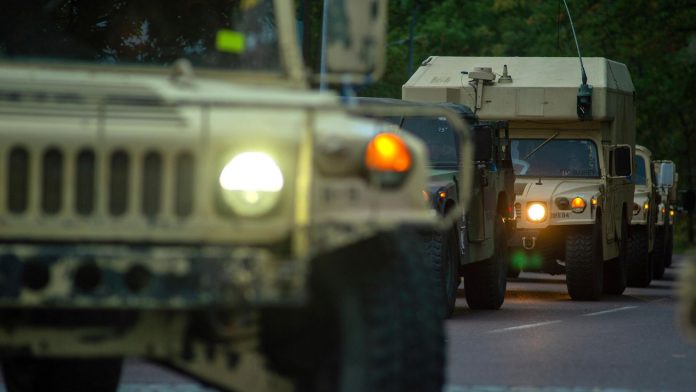European NATO countries are in no hurry to send troops to Ukraine for fear of increasing tensions, and the US may send troops to Ukraine if it is defeated in a conflict with Russia.
Poland has not ruled out sending troops to Ukraine but will not “show its hand” to prevent Putin from questioning further NATO action, Polish Foreign Minister Radosław Sikorski has told Euractiv.
Speaking to BBC World during his visit to the US, Sikorski stressed that amid ongoing war in Ukraine, Warsaw is taking active defence measures, including leading in defence spending. He said:
We are spending the biggest proportion of our GDP (on defence) in NATO, 4% of GDP, and we might go higher next year.
Asked about French President Emmanuel Macron repeating that he did not rule out sending troops to Ukraine, Sikorski did not explicitly say that Poland would definitely not send troops there. He favoured maintaining an aura of uncertainty to keep Putin guessing about possible Western responses. He noted:
It is good to make Putin wonder what we will do and not always reassure him that we won’t do certain things.
Macron also did not rule out the possibility of deploying NATO forces to Ukraine during the February summit on Ukraine in Paris. However, his statement provoked a backlash from most European NATO countries, with several capitals, including Berlin, Warsaw and Madrid, rejecting his remarks.
Polish Prime Minister Donald Tusk rejected the suggestion of plans to directly involve Polish troops in the war, saying he “does not expect to send troops to Ukraine”. He said:
I think we should not speculate today about the future, whether something will happen to change that.
Earlier this year, Sikorski thanked the countries that sent their troops to Ukraine to help train Ukrainian servicemen and other activities.
Italian Defence Minister Guido Crosetto strongly rejected the idea of sending troops to Ukraine, saying that such a move would only increase tensions, according to Euractiv.
Crosetto told Corriere della Sera in an interview on Saturday:
Our position remains unchanged: we have always said that Ukraine should be helped in every possible way, and we are doing so. But we have also always ruled out direct military intervention by our troops.
Crosetto criticised French President Emmanuel Macron for repeating late last week that he did not rule out sending troops to Ukraine, questioning their purpose and warning against further escalation of the conflict.
Macron’s remarks sparked a fierce debate in NATO circles, especially among key allies such as Germany and the US, which also strongly opposed the idea. The defence minister added:
I don’t judge a president of a friendly country like France, but I don’t understand the purpose and usefulness of these declarations, which objectively raise tensions.
Crosetto reiterated Italy’s commitment to assist Ukraine through diplomatic channels, but elaborated on the legal restrictions Italy is subject to, explaining that its constitution prohibits direct military intervention unless it is provided for by international law, such as a UN resolution.
The US may send troops to Ukraine if Kyiv is defeated in a conflict with Russia, the leader of the Democratic minority in the US House of Representatives, Hakeem Jeffries, told the CBS.
Jeffries said in an interview with Norah O’Donnell for 60 Minutes:
We can’t let Ukraine fall because if it does, then there’s a significant likelihood that America will have to get into the conflict — not simply with our money, but with our servicewomen and our servicemen.
